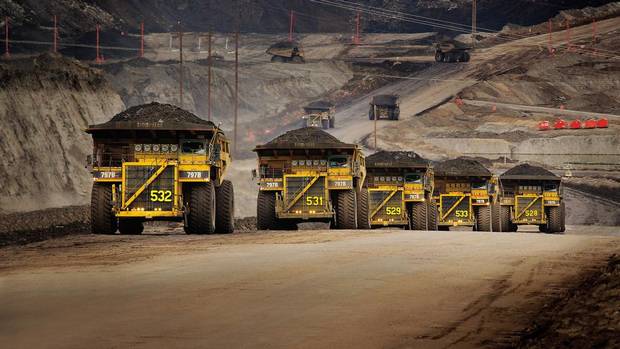Oil Sands Debate
Thomas Homer-Dixon and Konrad Yakabuski
Globe and Mail
Read the face-off between global governance expert Thomas Homer-Dixon and Globe columnist Konrad Yakabuski.
Resolved: The oil sands industry is distorting Canada’s economy and eroding its democracy in ways that will exact an enormous cost on our society over the long term.
How the oil sands industry is distorting Canada’s democracy and economy
THOMAS HOMER-DIXON
By 2030, Canada’s output from the oil sands will reach about five million barrels a day, more than twice today’s output. Yet, by 2030, chances are also good that the world will have placed a price on carbon emissions to spur energy innovation and wean humanity off carbon-based fuels. By then, climate change’s impact on global food security will have become starkly obvious. Already, heat waves and droughts in major grain-producing regions have caused food-price shocks and political unrest around the world.
On a planet with a rapidly changing climate, Canada should be figuring out now how to wind down carbon-intensive resource extraction. Otherwise we may soon find that we’re producing masses of stuff we can’t sell.
But anyone who even hints at this idea in Canada is regarded as nuts. Any politician aspiring to national leadership who says such a thing can kiss his or her political career goodbye.
The realities of climate change mean that the oil sands have a best-by date, and that date could come much sooner than industry boosters say. Yet to the extent Canadians are having a conversation about the oil sands, it’s restricted by no-go zones. And in the absence of a full debate, as I wrote recently in The New York Times, we behave like a gambler deep in the hole, repeatedly doubling down on our commitment to the industry.
We do so partly because the industry brings vast immediate benefits to Canadians: billions of dollars of salaries, royalties and taxes that pay people’s mortgages, put kids through school and support government social programs. We do it too because oil sands supporters and the Conservative federal government attack as unpatriotic anyone who criticizes the industry. In the minds of these folks, it seems, the interests of this industry have become synonymous with the interests of Canada.
In January, 2012, for example, in an open letter that is still available on his department’s website, federal Natural Resources Minister Joe Oliver says that “environmental and other radical groups” aim “to stop any major project no matter what the cost to Canadian families in lost jobs and economic growth. No forestry. No mining. No oil. No gas. No more hydro-electric dams.”
What nonsense. People opposed to the oil sands don’t want to wreck Canada’s economy. They want to stop an environmental and economic disaster. This kind of statement from an immensely powerful person such as Mr. Oliver only polarizes our society and shuts down democratic debate. It isn’t worthy of Canada’s long tradition of informed and tolerant civil discourse.
Our democratic conversation about the oil sands is constrained in other ways too. Canadians need to understand climate change and its consequences to make fully informed decisions about the industry. But the Conservatives have slashed funding for climate research, closed climate-research facilities, cut research on climate adaptation, reduced or eliminated funding to maintain archives of climate data, restricted online access to federally funded climate studies, and stopped federal climate scientists from talking about their research without advance political approval.
I believe it’s unlikely this assault on Canadian climate science would have happened in the absence of the oil sands industry’s influence – channelled through the Conservative’s powerful Alberta caucus – on federal policy.
When oil sands critics are attacked as anti-Canadian and the flow of scientific information needed to make informed decisions about the industry is restricted, Canada’s democracy is harmed. This is one of the reasons I argued, in my Times article, that Canada is beginning to exhibit the characteristics of a petro-state.
We’ll never become a fully blown petro-state, of course: Among other things, oil extraction doesn’t make up a sufficient fraction of the Canadian economy. But we know that societies highly dependent on resources such as oil have common features: Not only do the extraction industries gain influence over the state, but these societies’ economies often suffer from skewed capital investment and low innovation. The Organization for Economic Co-operation and Development, in its 2012 Economic Survey of Canada, identified exactly these features in the the country’s economy and suggested that they were partly a result of Canada’s dependence on natural resources.
Canadians need to start talking about whether it’s wise to keep putting so many economic eggs in such a fragile basket. Small-c conservatism used to mean a commitment to prudence in public policy. But with respect to the oil sands and the related issue of climate change, the policies of the current Conservative government are radical and reckless. They could cause Canada enormous future harm.
Thomas Homer-Dixon teaches global governance at the Balsillie School of International Affairs, University of Waterloo.
Why Canada needs to develop the oil sands
KONRAD YAKABUSKI
Opponents of the oil sands warn that Canada will pay a hefty price if it allows the development of this vast resource to continue at its present pace. Persuaded of Stephen Harper’s fealty to the oil lobby and Alberta’s interests, they are asking U.S. President Barack Obama to save Canadians from their own government by killing the Keystone XL pipeline. In the pursuit of their goal of permanently shutting down the oil sands, they even warn that Canada risks becoming a “petro-state” akin to Iran or Nigeria.
These are serious charges, but they are hard to take seriously. Petro-states are so dependent on oil revenue that their governments, often democratic in name only, suppress any interests inimical to oil development. Despite their vast (but unequally distributed) oil wealth, they slide backward in social and economic development. Does that sound at all like Canada? The Economist Intelligence Unit’s Democracy Index for 2012 ranks Canada in eighth place. Other than Australia and Switzerland, the only nations that rank higher are tiny, unitary states with (until recently) entirely homogenous populations.
Meanwhile, our economy is among the world’s most diversified. The oil and gas industry accounts for about 8 per cent of Canada’s gross domestic product, a smaller share than manufacturing. Oil sands crude makes up a growing share of overall petroleum production, but remains below 60 per cent of the total as conventional sources and Newfoundland’s offshore industry continue to experience growth.
To be sure, oil sands royalties are critical to Alberta’s fiscal health. And Ottawa relies on oil-related tax revenue from Alberta to fund federal programs. But Canada’s economy is not a single-cylinder engine. In fact, it is the most diversified economy among the G7 rich nations, with a “diversification quotient” of 6.25, compared with 5.55 for the United States, according to a 2008 Booz & Co. study.
While the oil sands will likely account for a greater share of Canada’s economy in the future, they are unlikely to expand at the furious pace their critics fear. (Indeed, they have rarely matched growth projections in the past.) Rising costs, a stubborn price discount on Alberta crude and fast-rising U.S. shale oil production are likely to temper the rate of oil sands development for the foreseeable future.
Still, the government would be foolish not to encourage such development. It is a source of valuable foreign investment that contributes to the country’s economic prosperity. The oil sands provide employment for thousands of highly skilled engineers and tradespeople, precisely the kind of workers Canada needs more of to ensure the survival of middle-class lifestyles.
What’s more, the Conference Board of Canada has demonstrated the extent to which the wealth generated by the oil sands flows across the country through interprovincial trade. That would accelerate with the proposed reversal of Enbridge’s Line 9 and the construction of TransCanada’s proposed Energy East pipeline, which would send Alberta oil eastward, fulfilling the long-elusive goal of a national energy strategy.
The oil sands also represent a tremendous opportunity for innovation through the development of low-carbon extraction methods. Made-in-Canada technology has allowed for a significant reduction in per-barrel carbon intensity of oil sands crude since 1990. Though oil sands crude is not the environmental scourge its critics make it out to be, faster progress needs to be made to lower its carbon profile. If it takes a carbon tax (higher than Alberta’s current $15-a-tonne levy) to accomplish that, the sooner the better.
Indeed, the environmental movement’s fixation on the “tar sands” has crowded out discussion of other important policy issues. Keystone has sucked up all of the oxygen in our national conversation and is tying up Canadian diplomats in Washington, whose precious time would be better spent on other files.
The Keystone obsession is actually proof of the vigorous debate and heightened scrutiny to which the oil sands are being subjected. Funny, then, that Thomas Homer-Dixon conflates the backlash against NDP Leader Thomas Mulcair – who, in 2012, said the oil sands had given Canada a case of Dutch Disease – with the erosion of our democracy. Mr. Mulcair can speak for himself. But it is unlikely his decision to tone down his rhetoric in the past year has anything to do with a suppression of his freedom of speech (see The Economist index). It probably stems from recognition that such talk is unbecoming of a national leader.
Distrust of Mr. Harper has blinded environmentalists to the fact the oil sands are not the pet project of one government or party. Campaign promises notwithstanding, it is debatable whether another federal regime would have moved faster to introduce climate-change legislation. But it is certain none could or would “shut down” the oil sands. For that would be truly undemocratic.
Konrad Yakabuski is a columnist with The Globe and Mail.

Topics
Energy
Environmental Stress and Conflict
